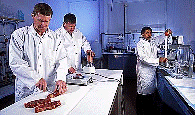United States Department of Agriculture: Agricultural Research Service, Lincoln, Nebraska

Roman L. Hruska U.S. Meat Animal Research Center: Reports
Date of this Version
1993
Document Type
Article
Abstract
Bacteria which degrade cellulose play a key role in animal digestion of plant material. As with all bacteria, these cellulolytic bacteria are able to regulate their growth and enzymatic activity by a number of mechanisms. One of these regulatory mechanisms may be catabolite repression.
This repression refers to the ability of certain bacteria to stop the metabolism of one substrate in preference to a second substrate. Sometimes termed "glucose effect," this repression is observed, for example, as the bacterium Escherichia coli grows on lactose. When glucose is then added to the growth medium, E. coli will stop utilizing lactose and use glucose instead. Thus, glucose causes a repression of lactose utilization.
Since soluble carbohydrates may be present in the microecosystem of cellulolytic bacteria, especially near the site of plant degradation, there is a potential for catabolite repression. This would negatively affect bacterial cellulolytic activity, thereby reducing efficiency of ruminal plant digestion. However, it is not clear which, if any, cellulolytic bacteria are capable of catabolite repression. Previous studies have not been conclusive because of a variety of confounding factors resulting from the experimental design. These include difficulty of adequately measuring substrate depletion, metabolic effect of other regulatory systems, and inhibition of cellulolytic activity by a decreasing pH of the growth medium.
Glucose analogs are chemical compounds which have the ability to ''trick'' the bacterial cell into thinking it is a food substrate, when in fact the analog is an imitation compound which the cell cannot metabolize for growth. Therefore, a small concentration of an analog can simulate the regulatory effect of glucose without serving as a growth substrate or interfering with carbohydrate transport. Since energy metabolism and bacterial growth will result only from cellulose degradation, many confounding factors are eliminated.


Comments
Published in Beef Research Program Progress Report (1993) No. 4 (Part 1): 112-113